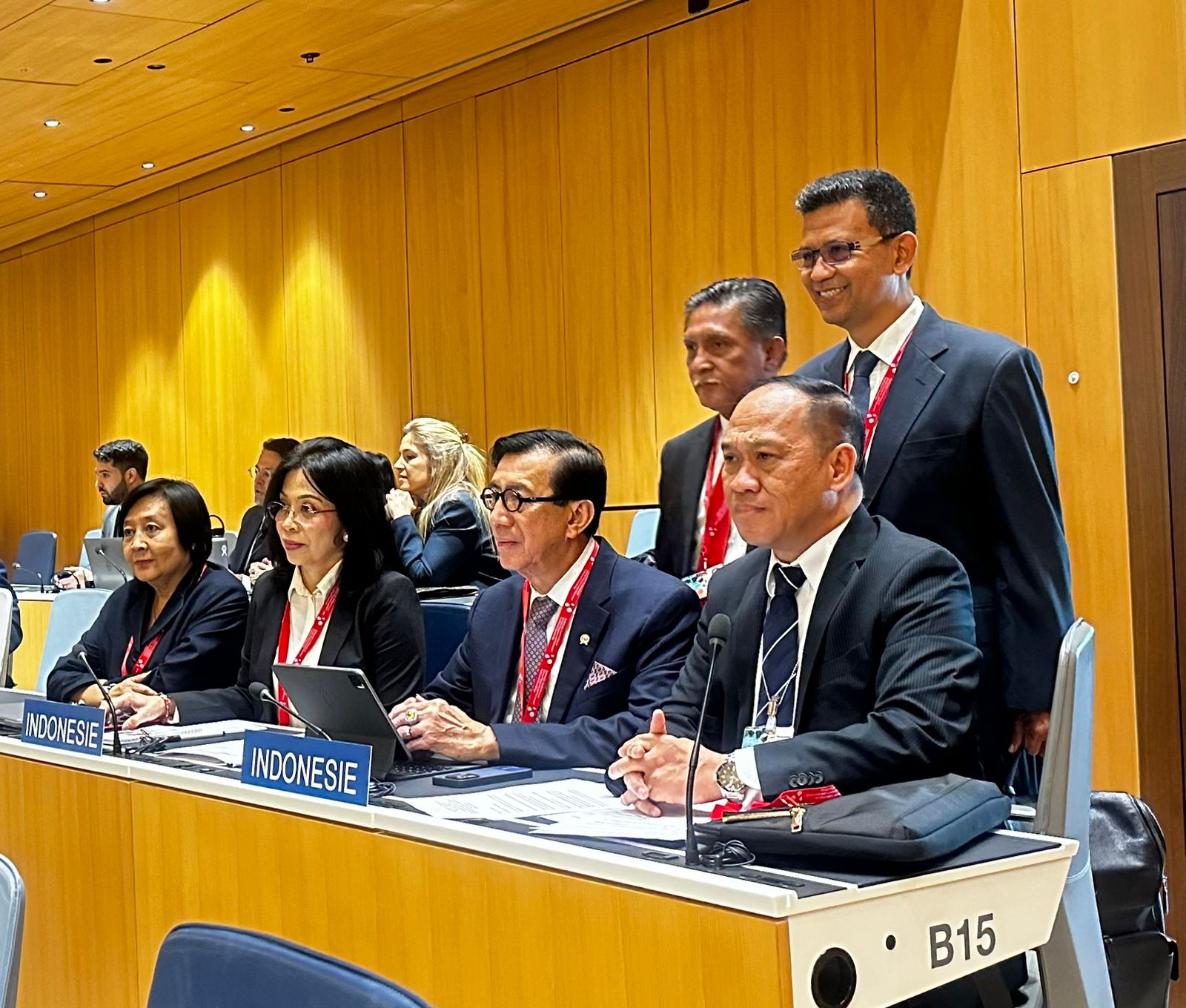GENEVA | Detiknews86.com – Minister of Law and Human Rights of the Republic of Indonesia (Menkumham RI) Yasonna H. Laoly led the Indonesian delegation to attend the Diplomatic Conference to Conclude an International Legal Instrument relating to Intellectual Property, Genetic Resources and Traditional Knowledge Associated with Genetic Resources (GRATK) which was held at the World Intellectual Property Organization Office(WIPO) in Geneva, Switzerland, from 13 s.d. May 24, 2024.
The GRATK diplomatic conference which was attended by more than 1600 delegates from 193 WIPO member countries was a very important and historic forum that WIPO member countries were looking forward to. For more than 20 years, this forum has discussed the issue of protecting genetic resources, traditional knowledge and traditional cultural expressions in the Intergovernmental Committee on Intellectual Property and Genetic Resources, Traditional Knowledge and Folkore (IGC-GRTKF) forum. The first IGC-GRTKF meeting was held in 2001.
In the forum, Yasonna delivered two remarks (statements); first, in Indonesia’s capacity as Coordinator of Like-Minded Group of Countries (LMCs), and second, in Indonesia’s capacity as a WIPO member country.
“LMC has been looking forward to holding the GRATK Diplomatic Conference for a long time. After more than 2 decades of discussion, hard work and compromise, the GRATK Diplomatic Conference was finally held. “The LMCs are ready to engage constructively to agree or produce a treaty/agreement,” said Yasonna.
Yasonna added, as parties who want an international treaty in the field of genetic resources and related traditional knowledge, LMCs see this GRATK Diplomatic Conference as an opportunity to overcome the imbalance in the intellectual property system in general and thepatents specifically.
LMCs are waiting for an international treaty to be agreed upon that will regulate minimum standards aimed at increasing the transparency of the patent system and preventing misuse of genetic resources and related traditional knowledge.
It was further stated that the LMCs also recognize the importance of respecting the rights of indigenous people and local communities as regulated in the draft agreement. Furthermore, LMCs emphasized that this can only be done through the establishment of mandatory requirements regarding the disclosure of the origin of genetic resources and traditional knowledge (mandatory disclosure requirements) accompanied by appropriate sanctions and compensation.
On this occasion, Yasonna also delivered a national statement, that for a long time Indonesia has recognized the importance of protecting genetic resources and related traditional knowledge.
“For Indonesia, the existence of an international legal instrument to protect genetic resources and traditional knowledge is very important for several considerations,” he explained.
First, an international treaty/agreement in the field of genetic resources and traditional knowledge will be a very important footprint of the joint efforts of WIPO member countries to ensure the protection of the rights of stakeholders, especially indigenous communities,local areas and countries rich in genetic resources and traditional knowledge.
Second, a treaty/agreement will not only increase transparency/openness and avoid errors in the patent granting process, but will also regulate minimum standards in the use of genetic resources and related traditional knowledge.
Third, WIPO and the intellectual property system can play a large and important role in realizing these efforts, including areas related to intellectual property that have not been handled by other international organizations.
Yasonna also emphasized that the mandatory requirement to disclose the origin of genetic resources and related traditional knowledge (mandatory disclosure requirement) must be an important achievement in the treaty that will be produced to ensure transparency and accountability.
Currently, Indonesia has made an important policy to implement disclosure requirements in the patent system to ensure that the origin of genetic resources and traditional knowledge is properly documented and appreciated. Through Law Number 13 of 2016 concerning Patents and Regulation of the Minister of Law and Human Rights of the Republic of Indonesia Number 38 of 2018 concerning Patent Applications, the Indonesian Government has regulated patent protection for genetic resources and traditional knowledge through disclosure requirements.
Before the start of the GRATK Diplomatic Conference, Yasonna held a coordination meeting to prepare Indonesia’s position with the Permanent Mission of the Republic of Indonesia (PTRI) to the UN, which was attended by all delegates, including the Deputy Head of the National Research and Innovation Agency, Members of the Advisory Council President, and Special Staff of the Minister of Law and Human Rights for Foreign Cooperation.
For information, also present as a delegation were the Deputy Permanent Representative of the Republic of Indonesia to the UN and WTO Achsanul Habib; Member of the Presidential Advisory Council Djan Faridz; and Director General of Intellectual Property Min Usihen. (Staf07/DN86)

